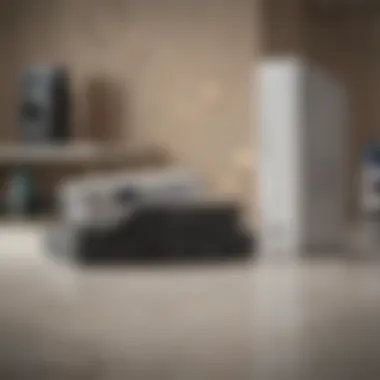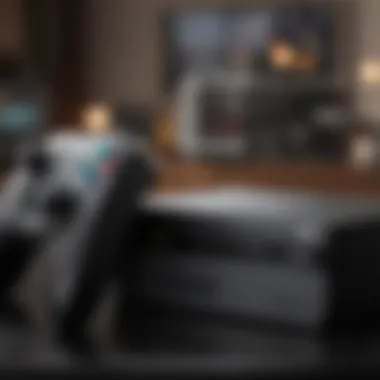Selling Your Wii Console at GameStop: A Complete Guide


Intro
Parting with your Wii console can feel like tearing the last leaf off a nostalgic tree, especially for enthusiasts attached to their gaming roots. The emotional connection gamers develop with their consoles often runs deep. However, when deciding to sell it, you’re stepping onto a path where both practicality and sentiment intersect. This guide dives into the process of selling Wii consoles at GameStop, guiding you through every twist and turn along the way.
Understanding the how-tos of selling isn’t just about making a quick buck. It's about ensuring you get a fair deal, maximize your console’s value, and understand all the options available to you. Whether you’re looking to upgrade, or just declutter your gaming setup, being informed can help you make smart decisions.
In this exploration, we’ll cover crucial preparation steps, factors that influence the valuation of your console, a breakdown of the selling process at GameStop, and alternatives if that avenue doesn’t fulfill your expectations. This engaging narrative will guide you through this personal journey, taking note of what matters most to you as a serious gamer.
Let’s dive into the meat of the matter!
Intro to Selling Wii Consoles
Selling a Wii console might seem like a simple task at first. Yet, diving into this process reveals layers of intricacies that can make or break your selling experience. As many gamers find themselves in a position where they want to either upgrade their setup or simply make some space, understanding the nuances of selling at a place like GameStop becomes vital. There’s a good chunk of reasons why you’d want to know this well—first off, you're likely looking to maximize your return while minimizing hassles. So, let’s sift through what this journey entails.
Understanding the Wii in Today’s Market
The Wii, released in 2006, captured hearts with its motion-sensing gameplay, and although it isn’t the latest gadget on the shelf, there can be a surprising demand for it in today's gaming landscape. Classic titles, the nostalgia factor, and a loyal fanbase keep the Wii relevant in some corners of the market, making it a collectible item.
But here’s the rub: prices fluctuate. As today’s consoles dominate headlines, you have to be keenly aware of where your console stands. Checking eBay or Reddit, and even digital marketplaces can help paint a picture of how much demand exists right now. Keep an eye on the vintage gaming scene; it can be that your old Wii is more valuable than you’d initially thought.
The Role of GameStop as a Retailer
GameStop is a player in the game, so to speak—an established retailer where many gamers turn when looking to buy or sell used hardware and games. Unlike online platforms, walking into GameStop provides immediacy; you get your cash or store credit that very day. There’s also the comfort of not having to deal with shipping, communication with buyers, or the potential risks that come with selling online.
However, this ease of selling doesn't come without trade-offs. GameStop tends to offer lower prices than personal sales on marketplaces, and their assessment criteria can be pretty strict. Consistency in the gaming community means it's crucial to keep realistic expectations as you navigate through this process. As such, knowing their evaluation norms and how to present your console can significantly impact your final outcome.
By understanding these elements thoroughly, you establish a foundation for a smarter transaction that aligns with your goals. Whether you’re just getting started or looking to refresh your gaming collection, this guide will help streamline your journey.
Preparation for Selling Your Wii
Preparing to sell your Wii console is often the make-or-break point in getting a fair price and a satisfying deal. It’s one of those things where the early bird gets the worm; taking time to prepare means you increase your chances of a successful sale. There’s more to it than just popping into GameStop and handing over your console. Potential buyers, including retail outlets like GameStop, often look for specific signs that indicate quality and care.
Assessing Your Console’s Condition
The first step in the preparation process involves a thorough assessment of your console's condition. Remember, your Wii's age and how well it has held up can significantly affect its value.
- Visual Inspection: Start by giving your console a solid look-over. Are there any visible scratches, dents, or marks?
- Functional Testing: It’s crucial to make sure everything works as it should. Plug it in, and check if the power button is responsive, the disc drive opens, and games can be loaded up without any issues.
- Cleanliness Matters: Dust and grime can make your console appear neglected. A good clean can go a long way. Use a soft cloth to wipe down the exterior and ensure that the vents are clear of debris.
This stage matters not just for your peace of mind but also for setting realistic expectations in terms of what GameStop might offer. If they see signs of wear and tear, they’ll naturally adjust their offer downward. As they say: ��“You don’t get a second chance to make a first impression.”


Gathering Accessories and Original Packaging
Next up is the task of gathering your accessories and original packaging. Now, you might think that just the console itself is enough, but the truth is, bundling everything together can substantially boost your chances of a better deal.
- Controllers: Include all the controllers that came with the console; this includes the Classic Controller or any Wii remotes and nunchucks. It offers a complete package feel and can be a key selling point.
- Cables and Chargers: Ensure that you have all cables, including the power cable and AV cords. GameStop usually prefers bundles to be complete.
- Original Packaging: If you still have the original box and manuals, that’s a significant plus! Items in good condition with their original packaging can draw more attention and possibly a higher price.
"A console with all its original accessories can often command a much higher resale price."
By taking the time to gather these items, you pile on value to your sale. Even small things like manuals and packaging can create a nostalgic atmosphere for buyers, especially for those who appreciate the full gaming experience.
In summary, preparing your Wii for sale is not a mere walkthrough; it’s a strategic maneuver. Evaluating the condition and assembling all components can lead to a more fruitful sale at GameStop. With the right preparations, you’ll be well on your way to ensuring a smoother transaction and possibly a better offer!
Understanding Value Assessment
When it comes to selling your beloved Wii console, the significance of understanding its value can't be overstated. Knowing the worth of your console can determine not just how much cash you walk away with, but also how you approach the selling process itself. Ultimately, it’s about making an informed decision that aligns with your expectations and needs.
Demand for the Wii Console
The demand for the Wii console remains surprisingly steady, even years after its initial release. The nostalgia factor plays a significant role here; many gamers recall the countless hours spent with titles like Super Mario Galaxy and Zelda: Twilight Princess. This fondness translates into a willingness to pay for used consoles, especially if they're in good condition.
Also, consider the audience; the Wii appeals not only to die-hard gamers but also to families and casual players who seek accessible entertainment. This diverse interest can create a niche market for your console, making it a hot commodity at GameStop. But remember, conditions like rarity, complete accessories, and working order can heavily influence perceived value in this competitive landscape.
"Nostalgia can hold sway over both buyers and sellers, influencing pricing far beyond mere functionality."
Depreciation Factors of Video Game Consoles
Understanding the depreciation of a video game console is crucial for assessing its current value. Most electronics, including video game systems, depreciate over time due to several factors.
- Age of the Console: The Wii was initially launched in 2006. As technology continues to evolve, older consoles can become obsolete, impacting their market price.
- Condition: A well-maintained console will fetch a higher price than one that's been through the wringer. Scratches, functional issues, or missing components can substantially decrease value.
- Market Trends: The resale market can fluctuate based on various trends. An uptick in interest for retro gaming, for instance, could enhance the value of an older console, while newer systems might overshadow it.
- Supply and Demand: Like any market, when more consoles flood the market than there are buyers, prices tend to take a dip. Conversely, if there’s more demand than supply, it might give you leverage during sale.
The Selling Process at GameStop
Selling your Wii console at GameStop can actually be a game-changer in your quest for a new gaming experience or simply to declutter your collection. This section focuses on the specific steps you need to take to ensure a smooth transaction, enabling you to navigate the selling process with confidence and ease. Understanding this process can provide benefits such as maximizing your trade-in value and streamlining your time spent at the store, both of which are crucial elements in a successful sale.
Initiating the Sale
First things first, to kick off the selling process, you will want to walk into your local GameStop ready to make your move. As you approach the counter, it’s useful to have your console in hand along with any accessories you plan to include. When you present your console, the staff will ask you a few questions about its condition and might even perform a quick physical inspection. This step is critical because it sets the tone for your negotiation.
Being open and honest about any wear and tear might just work in your favor. For example, if your console has minor scratches but still functions perfectly, mentioning this upfront can lead to a better understanding between you and the staff, which could ultimately benefit your offer. They often appreciate transparency.
Aside from the physical inspection, make sure to do a bit of homework on GameStop’s current trade-in values for the Wii. You can check this on their website or by looking in forums like Reddit for recent experiences from other sellers. It’s like having a map in unknown territory; it helps you get to where you need to be faster and with less hassle.


Completing the Transaction
Once the console has been assessed, the next step is completing the transaction. This is where things can get a bit tricky if you’re not on your toes. After the evaluation, GameStop will provide you with a trade-in value, often stored as store credit or cash. If you think the offer is reasonable, it’s time to finalize the sale.
Things to consider:
- Payment Options: Decide if you want to take store credit or cash. Store credit can often provide a little extra value for your next purchase.
- Final Checks: Make sure to double-check your trade-in offer, especially if you researched beforehand. If something seems off, don’t hesitate to ask.
- Documentation: Retain your receipt. You never know when you might need it for future reference, should any issues arise down the line.
In this stage, successful completion is more than just agreeing to a number. It’s about ensuring you’re comfortable with the offer while also being ready to make your next gaming move. If everything checks out, congratulations! You’ve successfully navigated the often-complicated waters of selling a Wii console at GameStop.
Potential Offers and Negotiation
Selling your Wii console at GameStop can be a bit of a mixed bag. Understanding potential offers and negotiation tactics can significantly alter your experience. This section delves into the nuances of dealing with GameStop's pricing structure and the art of negotiation to get the best offer for your beloved console.
Understanding GameStop’s Pricing
When walking into GameStop, having a grasp of their pricing strategy is essential. GameStop buys second-hand items based on a few key factors:
- Condition of the Console: How beaten up is your Wii? A console that still works well and is in decent condition is likely to earn you a better price than one that looks like it's been through a war.
- Market Demand: The popularity of the Wii can fluctuate. If demand is high, you may walk away with a more favorable offer. Trends can often swing; for instance, if vintage gaming is making a comeback, your console could be considered a hot item.
- Availability of Inventory: If GameStop has an abundance of used Wiis on hand, don’t expect top dollar. If stock is low, they might be more willing to negotiate.
GameStop generally provides an estimate for your console based on these factors. They may even have specific pricing tiers, meaning your console can fetch a different amount depending on how it measures up.
Strategies for Negotiation
Negotiation can feel daunting, but don’t let that scare you off. Here are some useful strategies that can help you secure a better offer when selling your Wii:
- Do Your Homework: Before stepping foot in GameStop, research what similar consoles are selling for online. Websites like eBay or specialized gaming forums on Reddit can give insights into current market values, aiding your negotiation stance.
- Don’t Accept the First Offer: GameStop's first price is often just that—a starting point. Be prepared to counter their proposal. A polite yet firm approach can go a long way. Mention your research and what you believe is a fair price based on comparable sales.
- Be Ready to Walk Away: Don’t play your hand too soon. If their initial offer doesn’t meet your expectations, communicate your needs. Showing that you’re not desperate can sometimes encourage them to offer a little more.
- Leverage Bundles: If you have games or accessories that you can throw into the mix, consider doing so. This can create a perception of added value, nudging them to up their offer slightly.
- Stay Calm and Friendly: It’s just business after all. Keeping a friendly demeanor can ease the tension and lead to a favorable outcome. A pleasant conversation might nudge the staff to go the extra mile for you.
Although it might feel strange to negotiate at a retail store, keep in mind that dealerships and retailers often expect some back-and-forth in discussions about pricing.
Exploring Alternatives to GameStop
Selling your Wii console at GameStop might seem like the go-to option, but there are other paths worth exploring. This part of the article shed light on the alternatives that can yield better returns or provide a more suitable experience. The goal here is to empower you with knowledge before you make any irreversible decisions about your beloved gaming system.
Other Retailers with Video Game Trade-In Programs
Don’t just stick to GameStop; there're several other retailers that offer trade-in programs with potentially better offers. For instance, places like Best Buy or Target might surprise you with their pricing or promotional events. Here are a few key points to consider:
- Value Comparison: Often, these retailers might temporarily boost their trade-in value during sales events or holiday seasons, giving you extra bucks for your console.
- Convenience Factors: Depending on your location, some stores may be closer or more convenient to access than GameStop, minimizing hassle.
- Customer Loyalty Rewards: Various retailers have loyalty programs that reward you not just for purchases, but also for trade-ins, so you might gain even more from selling your console.
In the end, it’s worth calling around or checking these competitors’ websites before you make your final choice.


Online Marketplaces for Selling Consoles
The digital marketplace is filled with opportunities to sell your console directly. Platforms like eBay, Craigslist, or even social networks like Facebook Marketplace let you reach a wider audience, possibly netting you a higher price. Here’s why online selling might be appealing:
- Potential for Higher Prices: By cutting out the middleman, you can often set a competitive price and keep all the profit.
- Flexibility of Timing: Selling online means you can choose your own schedule, making it possible to list your console at your convenience. Plus, it allows for negotiation directly with potential buyers.
- Broader Audience: Your console isn't limited to local sales; selling online gives access to buyers beyond your immediate vicinity, potentially leading to better offers.
However, doing so may come with its own set of challenges, such as shipping concerns or the risk of scams. To mitigate these risks, ensure you take quality photos of the console, provide thorough descriptions, and always communicate safely through the platforms' messaging systems.
Remember, a well-presented listing makes a significant difference in attracting buyers, whether in-person or online.
Exploring these alternatives not only expands your options but also equips you with alternatives that could lead to a more rewarding selling experience. Take the time to evaluate what aligns with your needs best.
Navigating GameStop Policies
Understanding the policies at GameStop is vital for anyone looking to sell their Wii console. Each commit in the selling process, from how your console is valued to what you can do if you change your mind, is shaped by these rules. This segment breaks down essential policies that impact your experience and could save you from frustration down the road.
Understanding Trade-In Policies
When it comes to selling your Wii at GameStop, being aware of the trade-in policies is key. Each retailer sets specific terms and conditions on how they will handle trade-ins. GameStop's policy is notably clear, which is both a boon and a bane.
Here are a few specifics to know:
- Condition Matters: The state of your console dramatically influences the trade-in value. GameStop is stringent about functionality and aesthetics. Make sure to clean the device and test it to avoid unpleasant surprises at the register.
- Required Accessories: You might think you can trade in just the console, but that's not the case. GameStop requires specific accessories, like power cords and controllers, to ensure they can resell your console. Check the exact requirements on their website before heading out.
- Documentation: Always bring proof of purchase if you have it. It can enhance the value offered since it shows the console’s legitimacy. If not, it can still be useful since they'll have a record of its conditions if issues arise.
By understanding these policies, you can enter the trade-in environment with your eyes wide open. You won’t be left scratching your head after a potentially disappointing interaction.
Returns and Refunds at GameStop
Though the focus is on selling, it’s important to address returns and refunds. Things can go sideways sooner or later and knowing GameStop's policy can provide peace of mind.
- Time Frame: You generally have a set period—usually a week—to return your traded items. After that, items can be challenging to return unless they’re defective. Just be aware of this time frame so you don’t get stuck with something you regret.
- Condition of Signed Items: If you mistakenly decide to return something, its beauty and functionality will play a role in whether you get a refund. Anything that has been tampered or damaged won’t fly under their radar.
- Refund Methods: Understand how you’ll be reimbursed; you’ll likely get store credit rather than cash back. This may bug some, but it’s standard practice. Knowing this helps set expectations—instead of thinking you’ll get your cash back from a trade, be sure you're looking instead at a store credit purchase.
The End
Reflecting on the process of selling a Wii console is crucial for anyone looking to part ways with their beloved gaming device. This article has explored various steps and considerations one must take when selling at GameStop, but it’s equally important to take a step back and think about the overall experience.
Reflecting on the Selling Experience
The journey doesn’t just end with handing over your console. Whether you’re a casual gamer or a die-hard Nintendo fan, each step in this selling process can evoke sentiments both nostalgic and practical. It’s essential to consider what the Wii represented in your life: perhaps it was a means of social connection with friends or a way to unwind after a long day.
- Evaluating Your Interaction with GameStop
When selling to GameStop, you engage with an established retailer that understands the gaming community. Their team assesses the value of your console while considering current market trends. Your interaction can shape your perception of the company and influences whether you'll return for future transactions. - Understanding the Financial Outcome
Financial assessment can sometimes lead to bitter tastes, especially if the offer is lower than anticipated. An honest evaluation of your console’s worth, based on condition and demand, becomes essential. Take a moment to weigh the benefits of getting cash now against the potential nostalgia associated with holding onto your console longer. - Lessons Learned from Pricing Negotiations
If you attempted to negotiate the price, what strategies worked? What didn't? Reflecting on these can prepare you for next time, making you more adept in future trades. - Future Considerations for Selling
Think about other options available if GameStop didn’t meet your needs. Online marketplaces, for example, can sometimes yield better returns but come with their own set of challenges. Knowing when to sell and where to sell is key.
Ultimately, taking the time to contemplate the entire process not only adds value to your experience but guides future transactions too. Selling a Wii is more than just a financial decision; it’s a chance to reflect on past gaming adventures and the relationships built.
"With every console sold, a chapter closes, but the adventures lived remain forever in memory."
In summary, navigating the process of selling your Wii console at GameStop requires careful thought on many fronts. From the emotional fallout to financial implications, consider all these facets as you move forward.



